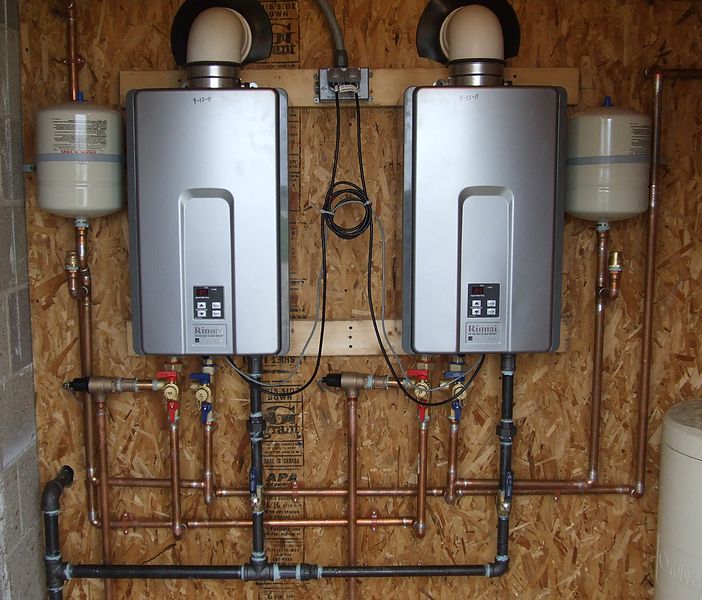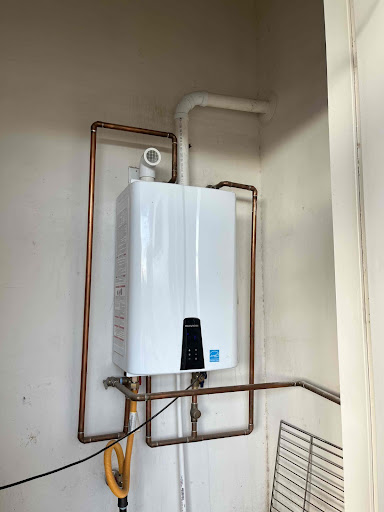Learning About The Pros Of On-Demand Water Heaters
Learning About The Pros Of On-Demand Water Heaters
Blog Article
The article author is making a number of great pointers about 5 Benefits of Tankless Water Heaters as a whole in the article on the next paragraphs.

In a world where benefit and effectiveness reign supreme, it's not a surprise that homeowners are constantly looking for smarter methods to manage their home's energy usage and comfort. One advancement that has progressively gotten appeal is the tankless water heater. But exactly what makes these systems stand out from the conventional tank-based models a lot of us grew up with? Let's dive in and check out the advantages of tankless hot water heater, helping you determine if it's time to make the switch in your house.
Introduction
Picture this: you step into the shower after a lengthy day, anticipating a soothing cascade of hot water, only to be greeted by icy droplets due to the fact that the last person utilized it all up. Noise acquainted? Typical water heaters store a set amount of hot water, suggesting you go to the mercy of that container's supply. Tankless systems, on the other hand, heat water as needed. No more going out mid-shower, no more fumbling with routines just to make certain hot water is available.
Understanding Tankless Hot Water Heater
What Are Tankless Hot Water Heater?
Tankless water heaters, sometimes referred to as on-demand or instantaneous water heaters, give hot water only as it's needed. Rather than storing gallons of pre-heated water, these systems kick right into action the minute you activate the tap. Water travels through a warmth exchanger, warming up in real-time, meaning you obtain a nonstop flow of hot water without the requirement for a large tank resting idly by.
Exactly how Do They Differ from Conventional Solutions?
Typical heaters hold a tank of warm water, making use of power to keep that container at a regular temperature. Tankless units get rid of the standing supply, lowering squandered energy and the cumbersome impact of a big cyndrical tube. Essentially, you're upgrading from a "accumulation" way of thinking to a "made-to-order" method.
Typical Kinds Of Tankless Systems
Tankless water heaters usually can be found in 2 selections: gas and electric. Gas versions tend to supply greater flow prices, ideal for larger houses, while electrical designs often serve smaller sized homes and are usually less complicated to set up. Furthermore, some systems are designed for point-of-use (offering one component) while others can take care of the whole home's hot water needs.
Key Benefits of Tankless Hot Water Heater
Power Effectiveness and Cost Cost Savings
No more warming a giant tank's worth of water and keeping it warm all the time. Tankless heating units minimize standby energy losses, which can reduce utility expenses. While the initial cost might be higher, the long-lasting cost savings often justify the financial investment.
3. Space-Saving Design
If your home is short on storage, eliminating the large container frees up beneficial area. Tankless devices are compact and can commonly be placed on walls, hidden in edges, or set up in limited utility wardrobes without monopolizing the whole area.
4. Longer Life-span
A well-maintained tankless hot water heater can outlast its tank-based cousin. Typical containers could last 10-15 years, while tankless versions can maintain downing along for 20 years or even more, making them a strong financial investment with time.
1. Unlimited Hot Water Supply
Ever before needed to set up showers so everybody obtains their fair share of warm water? With tankless, that comes to be a distant memory. As long as the heating system's flow capacity isn't exceeded, you can take back-to-back showers without becoming a popsicle.
5. Improved Water High Quality
Storing water in a container can occasionally cause sediment buildup or a slightly "off" preference. With tankless systems, fresh water is heated instantly, lowering the opportunities of sediment accumulation and potentially offering cleaner-tasting water.
Considerations Before Switching
Though the advantages are engaging, it's important to think about a couple of factors prior to totally devoting.
Reviewing Your Home's Water Use Patterns
If your household at the same time makes use of several fixtures with high warm water demand, see to it the system's flow rate fulfills your needs. Knowing your usage patterns helps you select the appropriate size and kind of tankless heating unit.
Upkeep and Treatment Tips
Tankless systems are reasonably reduced maintenance, however they aren't set-it-and-forget-it devices.
Regular Cleansing and Descaling
Hard water minerals can build up in the warm exchanger, impacting performance. Regular descaling (usually suggested every year) keeps the unit going for peak performance.
Yearly Professional Evaluations
A yearly checkup from a specialist makes certain small concerns are captured early. They'll examine the device's performance, search for leakages, and aid maintain optimum performance.
Preliminary Financial Investment Costs
Tankless heaters commonly come with a greater upfront cost. Between the unit itself and possible installation alterations, the first cost may provide you sticker label shock. However remember to see it as a lasting investment.
Installment Needs
Relying on your home's framework, you may need added electric ability or gas line upgrades. Guarantee you understand the installation needs and consult with an expert to avoid shocks.
Guaranteeing Correct Air Flow
For gas designs, correct air flow is essential to securely eliminate exhaust gases. Make sure airing vent systems are clean and properly mounted to stop any kind of prospective safety risks.
Contrasting Different Brands and Models
Not all tankless hot water heater are developed equal.
Looking Into Reputable Makers
Search for reputable brands with a background of generating high quality units. A trustworthy manufacturer usually supplies far better consumer support and longer warranties.
Setup: Do It Yourself or Expert?
While some home owners relish tackling tasks themselves, tankless installation may not be the most effective time to break out the tool kit.
Pros and Cons of Do It Yourself Installment
A do it yourself set up might save money, but it features risks. Incorrect installation can cause inadequacy or safety and security issues. If you come in handy and have experience, it may be viable-- however proceed with care.
Reviewing Reviews and Individual Comments
Individual evaluations and feedback from next-door neighbors or friends who have gone tankless can provide beneficial insights. Often, real-life experiences can be extra informing than marketing brochures.
When to Call a Specialist Plumber
For the majority of, calling a pro ensures everything's done properly. A professional plumbing technician comprehends local codes, sizing demands, and airing vent parameters, minimizing the danger of accidents.
Maximizing Performance
You've invested in a tankless unit-- now optimize its effectiveness.
Optimal Temperature Settings
Lots of people establish their units in between 120-140 F. Changing the temperature level can boost comfort and cost savings. Experiment to find a wonderful area that doesn't lose power.
Pairing with Low-Flow Fixtures
Intend to stretch your device's capacities? Consider mounting low-flow showerheads and faucets. They lower water use, enabling your tankless system to deliver a steady stream of warm water without straining.
Ecological Effect
Tankless hot water heater align with greener living objectives.
Lowered Carbon Footprint
By using much less power and just home heating water as needed, tankless systems can reduce your home's carbon footprint, decreasing your ecological impact.
Preserving Natural Resources
Less energy consumption and much less wasted warm water convert right into less natural resources being utilized, an ecological win-win.
That Profits A Lot Of from Tankless Heating systems?
The charm of tankless heating units is that they can match a range of homes.
Big Households vs. Solitary Owners
Huge family members might enjoy the limitless hot water supply, while solitary occupants appreciate the energy financial savings from not warming a whole container for just a single person's early morning shower.
Property Owners with Limited Area
If your home is short on square video footage, losing the cumbersome container frees up space for various other basics-- or possibly just a lot more elbow room.
Eco-Conscious Customers
Going tankless aligns with eco-friendly worths, ensuring you're not losing energy or resources.
Future Fads in Tankless Water Heaters
The globe of home appliances is ever-evolving, and tankless water heaters are no exemption.
Innovations in Modern technology
R&D is regularly enhancing warmth exchangers, making units extra efficient and resilient. Future designs could be also quieter, more portable, and better suited for differing climates.
Smart Home Integration
Think of readjusting your hot water heater's temperature level via an app or obtaining upkeep alerts on your phone. As clever home tech advancements, we'll see more connection and convenience.
Conclusion
Selecting a tankless hot water heater is greater than just upgrading your home's hot water system; it's investing in long-lasting convenience, power effectiveness, and a greener way of living. By considering your household's water use, being mindful of installation needs, and dedicating to routine maintenance, you can delight in a consistent stream of hot water without the luggage of a large container. As modern technology progresses, you can eagerly anticipate even smarter, much more efficient tankless solutions that not only make your life much easier however additionally profit the planet.
Why You Should Consider a Tankless Water Heater for Your Home
Energy Efficiency and Cost Savings
Tankless water heaters, also known as on-demand water heaters, heat water only when needed. This means they don't waste energy keeping a tank of water hot constantly. This efficiency translates into substantial cost savings on your monthly energy bills.
Endless Hot Water Supply
One of the significant advantages of tankless water heaters is their ability to provide a continuous supply of hot water. Traditional tank water heaters have a limited capacity and can run out of hot water, especially during peak usage times. In contrast, tankless water heaters can provide an endless stream of hot water, making them ideal for larger families or homes with high water usage.
Space-Saving Design
Tankless water heaters are compact and take up significantly less space compared to traditional tank heaters. They can be installed on walls, under cabinets, or even outside, freeing up valuable space in your home. This makes tankless water heaters a great option for smaller homes or properties with limited space for a traditional water heater.
Longer Lifespan and Lower Maintenance
Tankless water heaters typically have a longer lifespan compared to traditional tank heaters. They can last up to 20 years or more with proper maintenance. Additionally, tankless systems are designed with replaceable parts, which can extend their lifespan further and reduce long-term maintenance costs.
Environmentally Friendly
Reducing energy consumption not only saves you money but also benefits the environment. Tankless water heaters contribute to a smaller carbon footprint by using less energy to heat water. Their energy efficiency and ability to minimize standby heat loss make them an eco-friendly choice for environmentally conscious homeowners.
Customized Temperature Control
Tankless water heaters offer precise temperature control, allowing you to set the desired temperature to meet your specific needs. This level of customization ensures you always have water at the perfect temperature for your comfort and usage requirements.
https://beantownservices.com/blog/consider-tankless-water-heater-for-your-home

As a fervent person who reads about Unveiling the Hot Trend: The Benefits of Tankless Water, I thought sharing that piece was worthwhile. Make sure you take a moment to share this blog entry if you appreciated it. I am grateful for being here. Don't hesitate to check our blog back soon.
Schedule Report this page